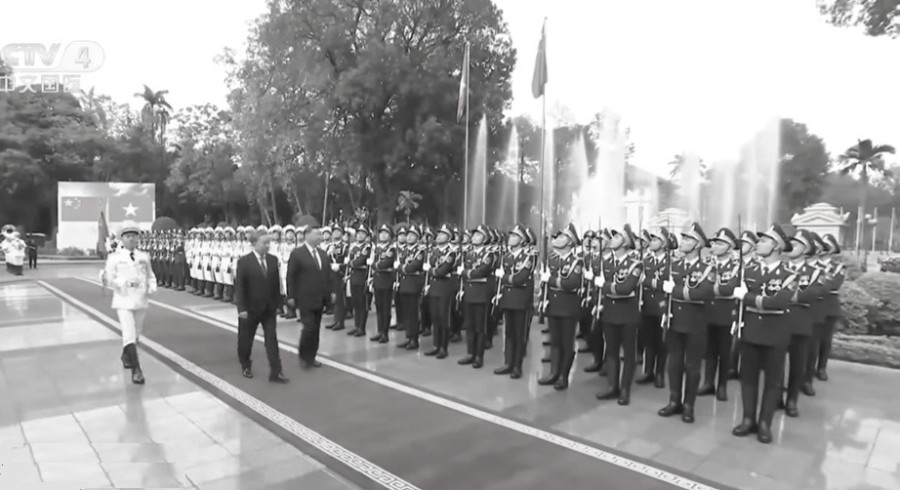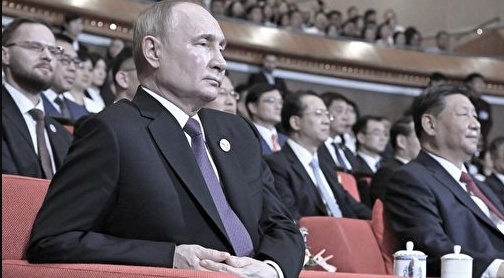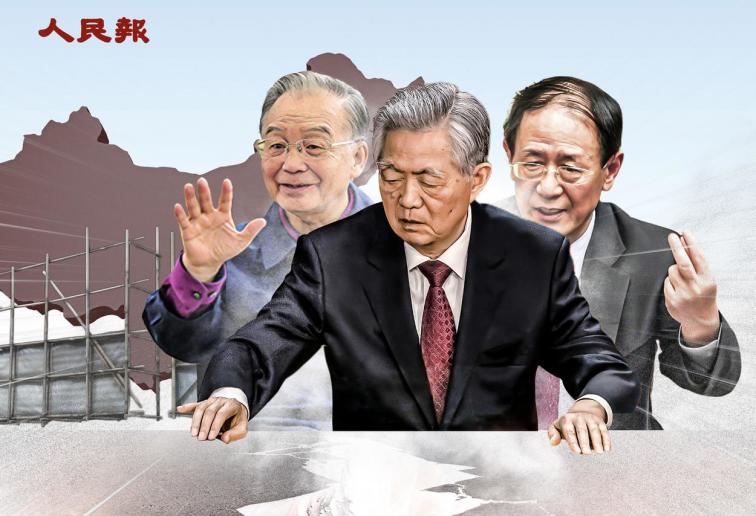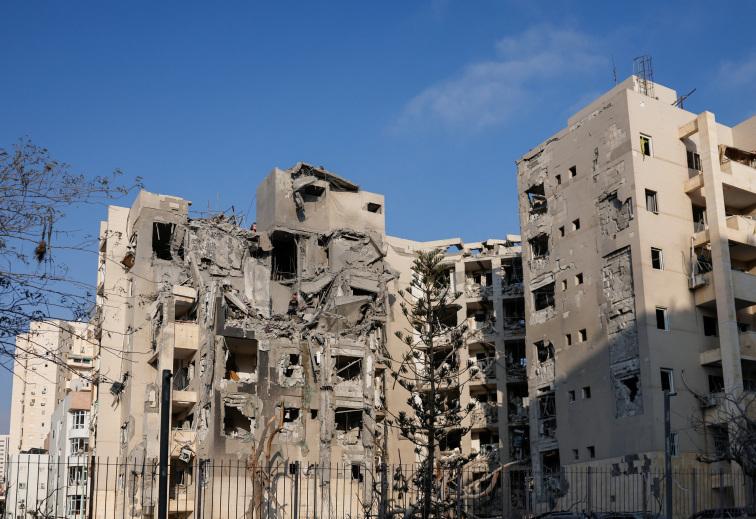On April 14, 2025, CCP leader Xi Jinping paid a state visit to Vietnam. In a video still, he can be seen walking with stiff legs and short, shuffling steps while inspecting the Vietnamese honour guard at the airport. (video screenshot)
[People News] On the morning of June 24, the CCP’s State Council Information Office held a press conference. Hu Heping, Deputy Head of the CCP Propaganda Department in charge of daily operations, outlined the general arrangements for the upcoming 80th anniversary of the victory in the War of Resistance Against Japan, scheduled for September. Major General Wu Zekuo, Deputy Director of the Parade Leadership Office and Deputy Director of the Operations Bureau of the Central Military Commission’s Joint Staff Department, specifically detailed the parade plans.
Compared with the arrangements for the 70th anniversary in 2015, there are few changes. However, this time the parade will include new military capabilities such as "unmanned intelligence systems, underwater operations, cyber-electronic warfare, and hypersonic weapons." Wu Zekuo claimed this demonstrates the PLA’s "strong ability to adapt to technological developments, changes in warfare, and win future wars."
In plain terms, after the U.S. successfully deployed stealth bombers to strike Iranian nuclear facilities—showcasing its unmatched military strength—China is trying to flex its own muscles to boost internal morale and continue to deceive its nationalistic base.
Of course, the most attention-grabbing announcement was that Xi Jinping, General Secretary of the CCP, President of China, and Chairman of the Central Military Commission, will attend the commemoration and deliver a major speech. He will also inspect the troops at the parade.
Recently, international observers have paid close attention to political shifts in Zhongnanhai. According to reliable sources cited by The Epoch Times, Xi Jinping has indeed lost much of his power, with military authority now controlled by Vice Chairman Zhang Youxia and former Premier Wen Jiabao, among other senior CCP figures. This indicates new personnel arrangements are underway. Questions like "Who will succeed Xi as General Secretary, President, and Chairman of the Military Commission?" and "Will power be handed to a single person or split among several leaders like Vietnam’s model?" have sparked various analyses and interpretations overseas.
Some leaks claim that the Fourth Plenary Session will be held in mid-to-late August, with a focus on personnel changes. Xi may announce his resignation as General Secretary and Military Commission Chairman. If he is also to relinquish the presidency, that would likely occur at next year’s “Two Sessions” (annual national congresses). However, judging from the official plans for the war commemoration in early September, Xi still holds all three titles—at least nominally. Russian President Putin also confirmed during his recent meeting with Chinese Vice Premier Ding Xuexiang that he will meet with Xi in Tianjin at the Shanghai Cooperation Organisation summit and again in Beijing.
Does this suggest the Fourth Plenary Session may not be held in August? Perhaps it has been postponed to September or October for some reason?
Historically, before the 1990s, the CCP held plenary sessions irregularly. Later, a convention was established: each five-year Central Committee typically holds seven plenary sessions, each with a specific focus. The First Plenary Session selects top CCP leadership and Politburo Standing Committee members. The Second focuses on government personnel appointments ahead of the national congress. The Third, often held in Q4 of the same year, addresses major policy initiatives and garners much attention. The Fourth through Sixth Sessions are usually held annually in Q4 to review various matters. The Seventh is a preparatory session for the next Party Congress.
The 19th Central Committee's Fourth Plenary Session was held in late October 2018. The 20th Central Committee's Fourth Plenary Session was originally expected in fall 2024, but since rumours of Xi suffering a stroke surfaced during the Third Plenary Session in July 2023, the entire party-state apparatus has exhibited anomalies, and the Fourth Session has yet to take place. A further delay to September or October due to internal party disagreements is not impossible.
Some may argue that Xi’s continued involvement in the upcoming military parade undermines reports of his power loss. But the author maintains that until the CCP power-holders make an official announcement, Xi and other high-level officials will continue “performing” to mislead the public. However, the regime still leaves subtle clues to signal the truth behind the scenes.
One such clue appears in the official language used to describe the parade arrangements, subtly revealing that Xi is being assigned to inspect the troops. This detail lies in Major General Wu Zekuo’s phrasing during the press briefing. He stated: “The Party Central Committee and the Central Military Commission have decided that a grand military parade will be held on September 3 in Tiananmen Square. General Secretary of the CCP, President of the State, and Chairman of the Central Military Commission, Xi Jinping, will inspect the troops.”
By contrast, at the 2015 press conference, Qu Rui, Deputy Chief of the General Staff’s Operations Department, opened by saying: “This parade, under the leadership of the Party Central Committee, the Central Military Commission, and Chairman Xi...”
During Xi’s years of consolidated power—especially after the 19th Party Congress, where he became the undisputed “core” leader—it would have been unthinkable for the phrase "Party Central Committee and Central Military Commission" to exclude “Chairman Xi.” That Wu Zekuo used this wording subtly signals that Xi no longer holds actual decision-making power and is merely fulfilling an assigned ceremonial role, despite still holding the title of CMC Chairman.
Furthermore, although Wu Zekuo ended by saying the parade would proceed “under the strong leadership of the Party Central Committee, Central Military Commission, and Chairman Xi,” this is merely ceremonial. Leadership does not equal real authority. His statement lacked any phrases about “loyalty” or “implementing the Chairman's Responsibility System,” and his tone seemed perfunctory, almost like a deliberate omission.
In addition to this telling detail, there are two other notable differences from 2015: 1. This year’s press release said: “On the evening of September 3, a gala will be held in Beijing, and Party and state leaders will attend,” without highlighting Xi. In 2015, this was not mentioned at all.
2. The announcement states: “In the name of the CCP Central Committee, State Council, and Central Military Commission, commemorative medals will be awarded to surviving veterans, comrades, anti-Japanese generals, or their relatives.” But it does not mention Xi. In 2015, the same language was followed by: “Xi will personally present medals to representatives.”
If Xi still held real power, would such statements omit his central role?
Finally, a detail worth noting: this year’s commemoration will also invite veterans from the former Nationalist Army (KMT). Wu Zekuo explained: “China’s war of resistance was a national effort, and the KMT military played a very important role. This parade will invite KMT veterans to attend as honoured guests.” In truth, it was the KMT army that bore the brunt of the fighting during the war. The CCP used the war to expand its influence. Even as the CCP grudgingly acknowledges this historical reality, it does so awkwardly—but at least it’s an admission of the KMT’s contribution. △
(Originally published by People News)











News magazine bootstrap themes!
I like this themes, fast loading and look profesional
Thank you Carlos!
You're welcome!
Please support me with give positive rating!
Yes Sure!